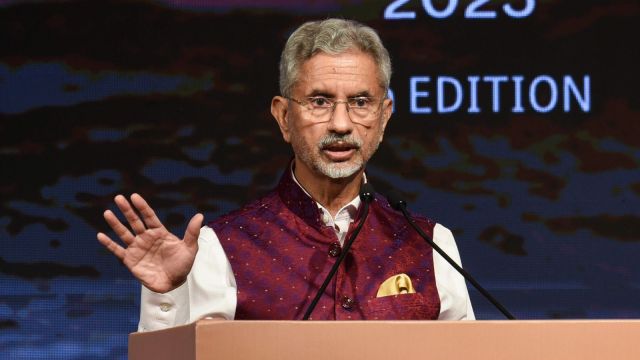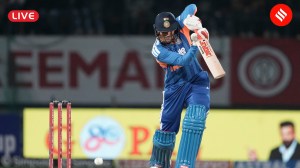Underlining that “there are things you can negotiate and there are things you can’t”, External Affairs Minister S Jaishankar said Sunday that India has been in talks with the US for “a trade understanding” where “our bottom lines and red lines are respected”.
He also said both sides “have not arrived at a landing ground for our trade discussions”.

Speaking at the concluding session of the Kautilya Economic Conclave in New Delhi, Jaishankar, referring to the Trump administration’s imposition of 50 per cent tariffs on India including 25 per cent over its purchase of Russian oil, said, “I am not minimising the issues, but I don’t think we should take it to a point, as though this is going to percolate to every dimension of the relationship… we need to see this in proportion.”
The US has been seeking access for its products in India’s agriculture and dairy markets. In his Independence Day address, Prime Minister Narendra Modi, without naming the US or its imposition of tariffs, said he is “standing like a wall” against any adverse policy that could impact Indian farmers, fisherfolk and cattle keepers.
Jaishankar, on being asked about the state of India-US ties, said, “There are issues, nobody is in denial. I also want to say a large part of the relationship is actually continuing, either as business as usual or in fact, in some cases, more than that.”
“Today, a big part of our issues with the US is the fact that we have not arrived at a landing ground for our trade discussions. And the inability so far to reach there has led to a certain tariff being levied,” he said.
“In addition, there is a second tariff, which we regard as very unfair… for sourcing energy from Russia, and of course, other countries who have done so including countries who right now have a far more antagonistic relationship with Russia than we do.”
Story continues below this ad
He dwelt at length on the additional penalty tariff levied on India by the US for import of Russian oil, saying this move by the US challenges the basics of competitiveness and market economics.
“At a time when you have price gaps on energy, when you have sanctions on energy, when you have subsidies on renewables, I am kind of scratching my head and wondering, where is market economics,” he said.
“When you have a world where trade was the central subject, consideration of trade has now become tariffs. Where are comparative advantages and competitiveness? It’s not just the basics of politics that we are revisiting in many ways, it is also the basics of economics,” he said.
“We are negotiating. It has got to be a trade understanding with the United States, the world’s largest market, but also because much of the world has reached those understandings. But it has to be an understanding where our bottom lines and red lines are respected,” he said.
Story continues below this ad
“There are things you can negotiate and there are things you can’t. And we are pretty clear about that, and that has been the conversation really, which has been going on since March,” he said.
On the future of the Quad grouping comprising the US, India, Japan and Australia – India to host the summit this year and there’s still no clarity on whether President Donald Trump will attend – Jaishankar assuaged concerns, saying “Quad is alive, and Quad is well.”
“This year, we have had two meetings of Quad Foreign Ministers, one in January, the first meeting after the Trump administration came to power, and one in July.”
“Quad has a sort of a bureaucratic set-up at different levels in different dimensions, people engage with each other, and that continues. Quad is alive, and Quad is well,” he said.
Story continues below this ad
Observing that the world is going through an extraordinary and intense period of change, he said, “One of the big changes of the last few years has been that the United States, which for decades worried about its exposure to external energy requirements, has not only become self-sufficient, but is actually exporting energy,” he said, adding that it has made energy exports an important part of its strategic outlook.
He also said, “The nature of weaponry, the nature of war has today fundamentally changed. We have seen that in multiple conflicts, starting with Azerbaijan-Armenia, Ukraine-Russia, Israel-Iran, contactless war can have a very impactful, sometimes even a decisive, outcome.”
He said while regions in the world, including the US, Russia and China, are actually defending their interests, India aims to go beyond that. “They are trying to maintain their positions, whereas the challenge for India is how to go beyond that, how do we rise in these troubles?” he said.
“For us, just defending what we have is simply not good enough at a time in our own history, in our own sort of curve,” he said.
Story continues below this ad
For India, he said, the road ahead entails making up for its lost decades in the manufacturing sector.
“Today, our challenge is to build manufacturing. Because there were decades… in a sense I would call it lost decades. So we have to play catch-up in many areas, but not in a way in which we miss the contemporary opportunities,” he said.
“If you look today at the kind of policies which the government is pushing – semiconductors, electric vehicles, renewables, drones – we need to get the optimal mix because at the end of the day, it is technology, which is going to make a big difference,” he said.









